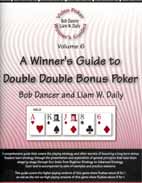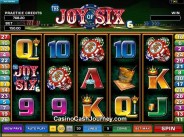
Winner's Guide Volume 6 - Double Double Bonus Poker
The Best Strategy for Double Double Bonus Video Poker
Editor's Note: Liam W. Daily and Bob Dancer immersed themselves in Double Double Bonus (DDB) a while back when finishing Volume 6 of their Winner's Guide series. This led to the following discussion Bob Dancer is one of the world's foremost video poker experts. He is a regular columnist for Casino Player, Strictly Slots, and the Las Vegas Review-Journa land has written an autobiography and a novel about gambling. He provides advice for tens of thousands of casino enthusiasts looking to play video poker. Bob's website is www.bobdancer.com regarding the strategy of the players who tackle this game.
Bob Dancer is one of the world's foremost video poker experts. He is a regular columnist for Casino Player, Strictly Slots, and the Las Vegas Review-Journa land has written an autobiography and a novel about gambling. He provides advice for tens of thousands of casino enthusiasts looking to play video poker. Bob's website is www.bobdancer.com regarding the strategy of the players who tackle this game.
One of our problems in the game is that we don't believe that most DDB players care much about pay schedules or exact strategies. Seeing a player play a 10/6 game (where full houses return 10 for 1 and flushes return 6 for 1 and the game returns 100.07%) is no surprise. Our eyebrows go up a little when we see players play 9/6 games, returning only 98.98% because giving up over a percent to the house is a large amount. What is a shocker is that players flock to a 9/5 game (97.87%) and even an 8/5 game (96.79%). We have to conclude that many players are so enamored by the possibility of receiving four aces with a 2, 3, or 4 "kicker", than they ignore the returns on the far more frequent full houses and flushes.
Since it is conceivable that serious players are interested in both the 10/6 and the 9/6 games, we'll present four complete strategies for these games: Beginners, Recreational, Basic, and Advanced. As in all of our strategies, "Basic" is as accurate as you can get without taking penalty cards into consideration. "Advanced" strategy gives you all of the penalty cards, except in some games we need to add appendixes because of the complicatedness. For the 9/5 and 8/5 DDB games, however, "Basic" strategy is as advanced as we go. We see no reason to explore these games to the nth degree simply because anyone capable of learning this game perfectly would be smart enough to avoid such a poor-playing game.
One interesting hand is Ac Qc Tc 5c 3d. How would you play it? It turns out that when flushes pay 6 for 1 (as in a 9/6 or 10/6 pay schedule), the proper play is AQT5. When flush return only 5 for 1 (as in a 9/5 or 8/5 pay schedule), the proper play is AQT. It's not obvious to many people why the relationship between these two combinations would change. After, a reduction in the value for the flush reduces BOTH the value of the 3-card royal and the 4-card flush.
There is a general principle at work here: The fewer cards required for completion of a combination, the more the value of that combination is affected by a change in pay tables. Since the 4-card flush needs only one card to complete a flush, it is affected far more than the RF3, which needs two cards to complete a flush.
When we examine the hand Ac Qc Tc 5c 3d as we go from 9/6 to 9/5, we see the value of AQT is reduced by 16¢ and the value of AQT5 is reduced by 96¢. The reason for this big difference is that ending up with a flush starting from AQT is a 1-in-31 times event and ending up with a flush starting from AQT5 is a 1-in-5.2 times event. Since a flush is six times as likely from AQT5 as it is from AQT, that's why the strategy changed.
Another example where the play chances between games (because of the same general principle) is Ac 5h 6d 7d 9d. Most "seat of the pants" players would either play the A by itself or the diamonds by themselves, whatever DDB pay schedule they were playing, but for a dollar player, keeping the diamonds is the better play in 9/6 DDB by 7.8¢ and the A by itself is the better play in 9/5 DDB by 9.7¢. As the return on a flush changed by 1 unit, the return on the diamonds (which become a flush once in 25 times) changes by 18.9¢ and the return on the A by itself (which becomes a flush once in 362 times) changes by 1.4¢.
Notice that this general principle doesn't tell you how to play any specific hand, but it does allow you to understand WHY the strategy changes from pay schedule to pay schedule. Take the hand Qc Jc 4d 5d 6d. Suppose you knew that the 456 was the better play in 9/6 DDB? What does that tell you about the correct play in 9/5 DDB? The answer is that the principle tells you that the diamonds would be reduced in value by MORE than the clubs, but it doesn't tell you "by how much". It turns out that in 9/5 DDB, the clubs ARE the better play. Knowing the principle helps you understand WHY.

